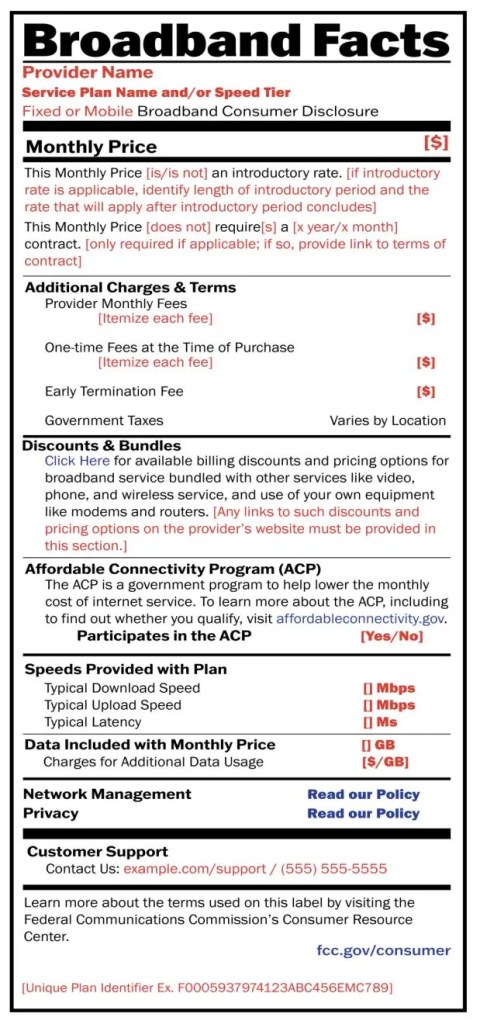from the transparently-terrible dept
After countless years pondering the idea, the FCC in 2022 announced that it would start politely asking the nation’s lumbering telecom monopolies to affix a sort of “nutrition label” on to broadband connections. The labels will clearly disclose the speed and latency (ping) of your connection, any hidden fees users will encounter, and whether the connection comes with usage caps or “overage fees.”
Initially just a voluntary measure, bigger ISPs had to start using the labels back in April. Smaller ISPs had to start using them as of October 10. In most instances they’re supposed to look something like this:
As far as regulatory efforts go, it’s not the worst idea. Transparency is lacking in broadband land, and U.S. broadband and cable companies have a 30+ year history of ripping off consumers with an absolute cavalcade of weird restrictions, fees, surcharges, and connection limitations.
Here’s the thing though: transparently knowing you’re being ripped off doesn’t necessarily stop you from being ripped off. A huge number of Americans live under a broadband monopoly or duopoly, meaning they have no other choice in broadband access. As such, Comcast or AT&T or Verizon can rip you off, and you have absolutely no alternative options that allow you to vote with your wallet.
That wouldn’t be as much of a problem if U.S. federal regulators had any interest in reining in regional telecom monopoly power, but they don’t. In fact, members of both parties are historically incapable of even admitting monopoly harm exists. Democrats are notably better at at least trying to do something, even if that something often winds up being decorative regulatory theater.
The other problem: with the help of a corrupt Supreme Court, telecoms and their Republican and libertarian besties are currently engaged in an effort to dismantle what’s left of the FCC’s consumer protection authority under the pretense this unleashes “free market innovation.” It, of course, doesn’t; regional monopolies like Comcast just double down on all of their worst impulses, unchecked.
If successful, even fairly basic efforts like this one won’t be spared, as the FCC won’t have the authority to enforce much of anything.
It’s all very demonstrative of a U.S. telecom industry that’s been broken by monopoly power, a lack of competition, and regulatory capture. As a result, even the most basic attempts at consumer protection are constantly undermined by folks who’ve dressed up greed as some elaborate and intellectual ethos.
Filed Under: broadband, consumers, fcc, fees, high speed internet, nutrition label, telecom, usage caps

